- Home
- Edward Lee
The Messenger (2011 reformat) Page 2
The Messenger (2011 reformat) Read online
Page 2
He collapsed in the last yard. His brain felt on the verge of shutting down. Part of him heard a quick scream from the house across the street at the corner. Then a moment later saw the new mailman walk out the front door and head casually to the next address. Before he knocked on the next door, the mailman turned slowly, smiled at Jimmy, and waved.
Chapter One
I
Twenty years later.
The scissors snipped! as the brand-new stainless steel blades sliced through the yellow ribbon. When the ribbon parted and fell, the small crowd that had gathered began to cheer.
That was simple, Jane thought. She handed the scissors back to the mayor. Flashbulbs popped and the applause grew loud. There were even some writers and photographers from the local papers in the crowd. It wasn't that big a deal but it looked like it. All this hoopla, Jane thought, and all for what? We're opening a new post office, for God's sake. In a small town, however, even something like this was an event. Jane didn't go for cameras and publicity-she was all business. She was almost ill at ease.
Yeah, she thought again. This was simple. Now the hard part starts.
"Thank you, Jane," the mayor said into a microphone. It was possible that he'd had a vodka tonic or two before the opening ceremony. "And now that the ribbon is cut... let's go inside for cookies and punch!"
"Jesus," Carlton Spence said under his breath. "Cookies and punch. Is this corny or what?"
Jane whispered back, "Don't be too sure. You haven't tried the punch."
Jane smiled and nodded, shaking hands with the people in the crowd as they filed into the post office. I am so bad at this game, she told herself. When most of the crowd had filed in, Carlton sighed. Carlton was Jane's assistant now, amiable, early forties, often quick with some good-natured sarcasm. He was as good at his job as Jane was at hers, and that's why she knew they'd make a great team. He was also very perceptive sometimes.
"Either your dog shit in your shoes this morning," he said, "or this whole grand opening thing is making you very uncomfortable."
"I don't have a dog."
"I know."
She made a weary smile. "I just want to get on with it. Get all this foolishness over with and get on with the job."
Carlton scratched the beer belly he'd been working hard on for the last twenty years. "Small-town politics and all that. Opening a new post office in a little burg like Danelleton is like opening a skyscraper in a big city." A photographer snapped a quick picture of the two of them, then hustled inside. Carlton frowned. "Besides, we gotta give the local papers something to write about, don't we?"
Jane was grateful for the implication. Danelleton had one of the lowest per-capita crime rates in the state. I guess I should be happy this is the big story of the week instead of a drive-by shooting or crack cocaine bust.
"Oh, and one other thing," Carlton said, "congratulations on the promotion, Jane. You'll do a kick-butt job running this place."
"We'll do a kick-butt job, Mr. Deputy Assistant Postmaster."
"Isn't that kind of like the assistant to the assistant to the assistant of the assistant secretary of state?"
"Sure. You're the one who makes the coffee, and I'm the one who delivers it."
They both laughed but they knew it wasn't that bad.
Carlton looked up at the sun. "Things will be great, just you watch."
"I hope so," she said. "But I still don't quite understand why Danelleton needs a second post office."
"Are you kidding? In the last twenty years, the town's population has quadrupled. The main post office at the town square just isn't enough anymore. It's progress, Jane. That's a good thing. More people moving here means more money for the local economy? Carlton shrugged. "More mail to be delivered. And lemme tell ya-" He looked up at the sun again, the perfect cloudless sky. At the same moment, a group of lorikeets flew by. "There are worse places to work for the post office."
"I know, we get Florida paradise, and the other chumps get to deliver mail in the South St. Pete ghettos. Don't worry, I'm not taking things for granted, and I really am looking forward to this-"
Jane paused to look at the small but well-designed building. It's mine, she told herself. Suddenly her discomfort over the grand opening was displaced by pride. I'm the boss. This little post office annex is my baby. Cool air swept their faces when the automatic doors parted. They walked inside, ignoring the continued grand opening formalities over by the gift shop-where the mayor appeared to be getting drunk on spiked punch-and turned toward the clerk stations.
"So much for punch and cookies," Carlton said.
Customers were lining up to buy stamps, send packages, get mail metered.
"Yeah," Jane said, "I guess we better get inside and start taking care of these customers. Jeez, look at them all."
Carlton scratched his beer belly again. "Aw, don't sweat it. I'll bet half of them are only here for the newest Elvis stamp."
Jane could only hope so. No time like the present, she thought. "See ya at the end of the shift, Carlton, and don't forget to have someone clear all those old records out of the basement. We don't want the fire department writing us up for fire hazards the first week we're open." Then she went through the half door to head into the administrative wing. It was quiet in back, but if she listened carefully she could hear the trucks pulling up in back at the loading dock. Her footsteps ticked across the brand-new tile.
In a lost moment, she caught herself peering at her reflection in an office window. How do you like that? She asked herself. Thirty-five years old, and I'm still not half bad looking. The knee-length navy blue skirt and patched sky-blue tunic notwithstanding, Jane's looks, if anything, had improved as she'd grown older, as if her desirability had seasoned and maximized. Boobs not sagging yet, stomach's still flat, even after two kids. I really can't complain. Noon-blue eyes looked back at her; the uncertain expression changed with a confident smile. Her hair was too bright to label her a brunette, but it wasn't auburn either-something more like cinnamon-a little shorter than shoulder length. The bright shine to her hair was augmented by a rich nut-brown tan, an overall glow of vitality.
Body wise, Jane was happy to see that all the right curves had remained in all the right places. Her breasts filled the top of her tunic, ghosts of nipples showing through the light fabric, and when she cocked her hip and grinned, she even looked sultry. Somehow that look isn't me, she laughed to herself. Vie Hussy Mail Chick. Instead, she simply looked like a beautiful, self-assured modern working woman, still in good shape and still at her peak. I've got a lot to look forward to, and even better than that- She laughed to herself again-construction workers still whistle at me!
The good day had just gotten better, with a positive acknowledgment of herself. It hadn't always been like that, not since the move ... and the loss of her husband. Sometimes being a widow with two young children seemed impossible. It was impossible to do everything right, too many obstacles seemed to have dropped on her, too many hardships.
She'd felt very insecure at times, very doubtful.
But she'd persevered, and now things couldn't be better: the promotion, the new post office, the kids adjusting better to school and their lives without a father.
And now this ...
Jane's eyes roved up the office window that framed her reflection, to the words stenciled in black letters near the top:
jane ryan, station manager,
danelleton, west branch.
II
Idyllic wasn't the word; it didn't suffice. To call the town romantic, picturesque, or quaint proved trite but at least accurate. Danelleton had grown, yes, but it hadn't lost any of the traits that made it so unique in this day and age. Once just a little suburb in central Florida, now it was incorporated, flourishing, progressing without giving up its honest luster. Perhaps its location kept it isolated-off a major thoroughfare beyond an old county road that appeared rural-or perhaps something even spiritual protected it from the corruption that tended to fo
llow real estate development near tourism hubs. Who knew? It existed between Tampa and St. Petersburg-big cities with big crime waves-yet Danelleton boasted almost no crime. Last year, for example, the most serious crimes to be committed were one stolen bike, some graffiti spray-painted in a Main Street alley, and a tipped-over Johnny On The Spot at a construction site. No drugs here, no rapes, no armed robberies.
Just a ten-minute drive to the beaches of the Gulf of Mexico. Excellent schools, superior municipal services, an abundance of community organizations and charity groups. Real estate costs had miraculously remained reasonable when they'd skyrocketed in other towns. Plenty of day care, plenty of activities for kids. Families were close-knit; everyone looked out for everyone else. There was little riff-raff. There was no "bad" part of town. In essence, Danelleton proved the model for middle-class Florida life.
And the beauty.
Palm trees lined well-groomed streets of plush green lawns, colorful gardens, and humble but immaculate homes. More plush green served as a backdrop for the east side of the town: the rise of the forest teeming with fern and Australian pine trees. To the west spired the tall lemon-yellow water tower emblazoned with bright pink words: it's a beautiful day. The town square radiated sedate charm while boats rocked quietly in bayside slips, mooring ropes chiming against their masts. The sun always seemed brighter in Danelleton, the sky more expansive, the air more pure.
What more could anyone ask of a place to live? Who wouldn't want to live here? Danelleton was as close to perfect as any town could ever strive to be. Beautiful, civilized, and safe. No drugs, no rapes, no armed robberies, no murd-
Well, there were some murders once. But that was a long time ago.
In the basement.
God, what a mess, Carlton thought. He kneed his way into the dark cubby, clumsily wielding the flashlight, extricating decades-old boxes with his other hand. The only way to get to the end was to dig everything out. But Jane had been right about one thing: This basement is a fire hazard, Carlton realized, dust-covered now. If the inspectors saw this, they'd make us close down until we got it all cleared out. The refuse consisted mainly of old boxes of records, antiquated sorting machines and spare parts, old uniforms, and out-of-date packing items. Carlton figured if he took all these boxes outside he could build a pyramid out of them as high as the post office.
I'm second-in-charge of this place and look at me. I'm hauling junk out of the basement. Carlton doubted that these tasks were in his government job description.
He laughed through it, though, a good sport, even as cobwebs spread and stuck to his face. It was a dull process: crawl in, grab a box, drag it out, then crawl back in for the next one. It would take the rest of the day more than likely, but at least he could look forward to the end of the shift when he could stop by the bar- covered in dust and cobwebs-and celebrate the first day of his promotion.
Carlton had no sour grapes that Jane had been named branch station manager instead of him, even though he had more time and grade. He was better at the dirty work anyway, keeping the employees on their toes, while Jane could deal with the red tape and management duties. In truth, he was happy for her, and he was happy that the town had opened this second postal facility, because it proved that Danelleton was prospering. More residents meant more homes, hence, more mail than the main post office could handle on its own anymore. Carlton and Jane, in fact, had both begun their careers at the main facility at the town square, and the place didn't exactly bring back good memories. Christ, he thought as an image from his past swept through his mind. Suddenly he paused at a twinge of despair.
He took a breath, counted off a few moments, then grabbed another box and began to drag it out.
The main post office was where he'd thought he was starting his family life, but in truth it had been where he'd ended it.
Don't think about it, he warned himself. It's over. It's done. You got a new life here so get on with it. The past is the past, good and bad.
He rarely did think of it lately, even over the past handful of years. He'd gotten over it, with the help of time, reason, and a good shrink.
Get off that shit! Grab another box and do your job!
Subconsciously, he supposed, he'd never be rid of it. How could he be? How could anyone? And what he couldn't figure, as he dragged yet another box of old post office records out of the crawlway, was why now? And why here, of all places? He'd never been in this building before his promotion. The Danelleton west branch had originally been closed and abandoned for the past twenty years. For that time period all mail was processed through the main office at the city dock. This just reopened facility meant nothing to Carlton.
He shook his head in the musty darkness edged by the flashlight beam.
What was it about this building that triggered the worst memories of his life? He forcibly tried to shut his mind off, and dragged another box from the cubby, grunting. Sweat darkened his collar. His heart was beating faster.
First Mariel, he thought. Then Belinda.
It had all happened so fast, sometimes it still seemed like a dream. After eight fine years of marriage-and with no warning signs-Mariel had lost it. Totally. In layman's terms, she'd gone off the deep end. In psychiatric terms, she'd suffered a systemized psychotic break with paranoid ideations, amine-related mania, and traits of something called Capgras syndrome. In other words, Carlton's wife had begun to believe that nobody and nothing around her was genuine. She believed that Carlton, for instance, wasn't really Carlton but an identical impostor. She believed the same of the neighbors, her friends, and her parents, anyone close in her life. They were all fakes. She even believed it about the house, the car, and eventually, the entire neighborhood.
Everything had been manufactured as part of a plot to fool her. After the fact, Carlton had read about the syndrome on the Internet. It was rare but very real, spurred by either an organic brain defect or micro tumors. Untreatable, in other words. Carlton had lost his wife in the wink of an eye.
And his daughter, Belinda, too.
Seven years ago, he realized. Belinda would be going on nineteen now-and then he reminded himself: Not "would be." She is. She is going on nineteen now.
One thing Carlton would not give up hope on was the prospect of Belinda still being alive. Mariel's body had been recovered from the wreck but Belinda's body had never been found. There was no blood of her type in the wreckage, no forensic signs that she'd been injured. She'd been eating Cracker Jacks in the car and the fingerprint people found
Belinda's prints and traces of corn syrup and sugar on the seat belt buckle and passenger door handle, so she'd clearly been buckled up.
For whatever reason pertaining to her illness, the one person Muriel didn't believe was counterfeit was Belinda. So one night, she'd put her daughter in the family station wagon and left town-in her mind believing she was saving herself and her daughter from the "plot." She'd made it as far as Baltimore before a drunk driver had crashed into them on
Interstate 95. Muriel had been vaulted through the windshield-she always forgot to wear her seat belt-and broken her neck on impact. Instant death.
But Belinda's body was not to be seen.
Don't think about it, don't think about it, don't think about it. The words kept pounding in Carlton's mind.
But something-for some reason-forced him to think about it.
The drunk driver had been killed too, so there was no living witness directly on the scene. Maryland state police, however, told Carlton a motorist who'd pulled over to help had seen another vehicle leaving the shoulder just as he'd stopped. In the back window the motorist thought he'd seen two adult men and another shorter figure. "Shorter, sitting lower, like a kid maybe," he'd reported.
"I know this is very difficult for you to accept, sir," an FBI agent had later told Carlton, "but it's our speculation that your daughter was abducted from the scene by an illicit party."
Abducted? Illicit party?
No. This would never be
something he could ever "accept."
Surely, Belinda, traumatized by the crash and witnessing her mother's death, had gotten out of the car in a state of shock and was seen by another passing motorist. Not an illicit party. Just some normal decent person who'd seen the wreck and spotted a little twelve-year-old girl in the road. He'd picked Belinda up and taken her to a hospital. Surely, Carlton would hear from the authorities that Belinda was safe, recovering, and soon to be returned home.
After a couple weeks, part of Carlton knew that that was not the case. And after a couple of months, another part of him suspected that he'd never see his daughter again. She'd been abducted by an illicit party. For God knew what purpose.
Eventually the authorities apprized him of the worst possibilities, but Carlton didn't listen. He could not think about his precious daughter in such terms. Instead, he clung to the best possibility. That some otherwise decent people had taken Belinda, because they couldn't have a child of their own. "I mean, it's possible, right?" he'd practically begged the FBI agent. "Something like that could've happened. Right?"
"Of course, sir. Things like that happen every day..."
That's all Carlton needed to hear, and that's where he'd left it. He'd left it all with that stray hope and no reason to believe otherwise. And then he'd put it all aside, to the best that any man in the same horrible situation could.
Until now.
Until he'd come down into this dark old basement to clear out a bunch of twenty-year-old boxes that posed a fire risk.
Oh, Belinda. Please be alive. Please be okay. Please be with people who are taking care of you.
He'd read about things like that all the time, and seen it on television. Otherwise well-meaning couples who were miserable because they couldn't have kids. So they'd take someone else's. And in that situation? Seeing her mother killed? Crawling out of the car in a state of shock? It was feasible that Belinda would've blacked the memory out. The new parents would tell her that not only her mother had been killed in the wreck but Carlton too. Or maybe she wouldn't remember anything of her past, including Carlton. Delayed stress reaction. Amnesia. Things like that. Carlton could only pray that that's what had happened.

 In the Year of Our Lord 2202
In the Year of Our Lord 2202 The Minotauress
The Minotauress Terra Insanus
Terra Insanus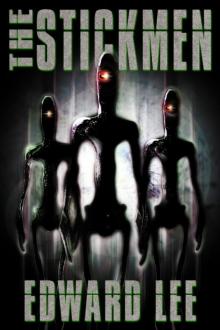 The Stickmen
The Stickmen Flesh Gothic by Edward Lee
Flesh Gothic by Edward Lee Family Tradition
Family Tradition You Are My Everything
You Are My Everything The Backwoods
The Backwoods The Teratologist
The Teratologist Smoke and Pickles
Smoke and Pickles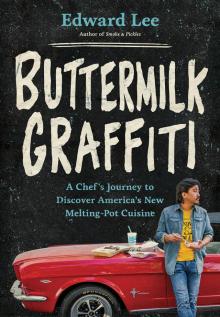 Buttermilk Graffiti
Buttermilk Graffiti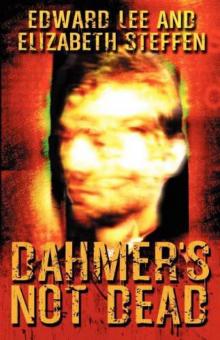 Dahmer's Not Dead
Dahmer's Not Dead Quest for Sex, Truth & Reality
Quest for Sex, Truth & Reality The Innswich Horror
The Innswich Horror Brides Of The Impaler
Brides Of The Impaler Goon
Goon Trolley No. 1852
Trolley No. 1852 Sacrifice
Sacrifice Monster Lake
Monster Lake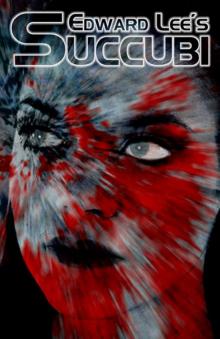 Succubi
Succubi Lucifer's Lottery
Lucifer's Lottery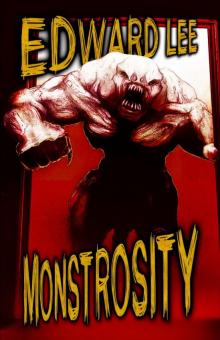 Monstrosity
Monstrosity The House
The House The Dunwich Romance
The Dunwich Romance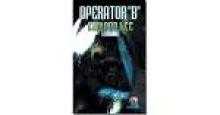 Operator B
Operator B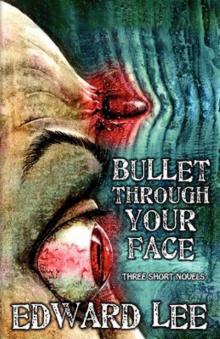 Bullet Through Your Face (improved format)
Bullet Through Your Face (improved format) Grimoire Diabolique
Grimoire Diabolique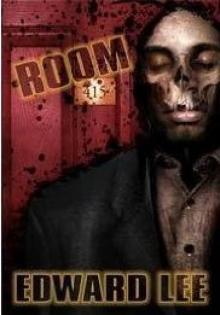 Room 415
Room 415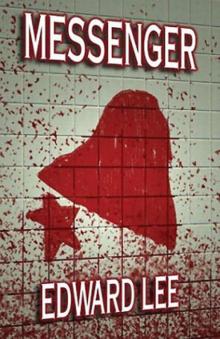 The Messenger (2011 reformat)
The Messenger (2011 reformat) Incubi
Incubi The Black Train
The Black Train House Infernal by Edward Lee
House Infernal by Edward Lee City Infernal
City Infernal Creekers
Creekers The Haunter Of The Threshold
The Haunter Of The Threshold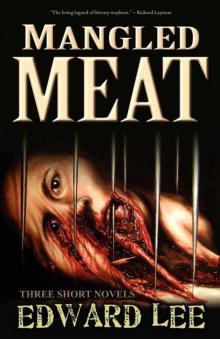 Mangled Meat
Mangled Meat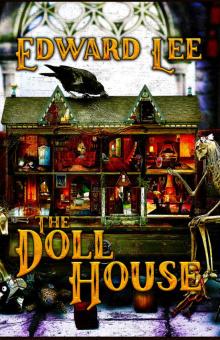 The Doll House
The Doll House Header 2
Header 2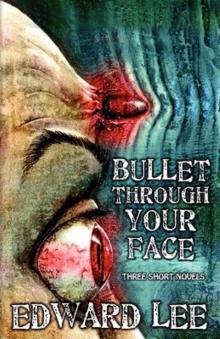 Bullet Through Your Face (reformatted)
Bullet Through Your Face (reformatted)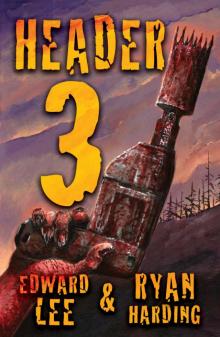 Header 3
Header 3 Infernal Angel
Infernal Angel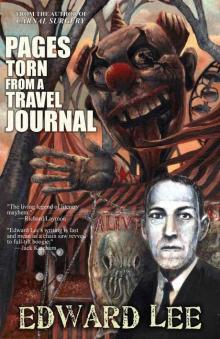 Pages Torn From a Travel Journal
Pages Torn From a Travel Journal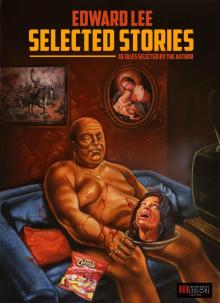 Edward Lee: Selected Stories
Edward Lee: Selected Stories The Bighead
The Bighead The Chosen
The Chosen